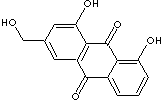ALOE-EMODIN
PRODUCT IDENTIFICATION
481-72-1

H.S. CODE
TOXICITY
1,8-Dihydroxy-3-(hydroxymethyl)anthraquinone; 1,8-Dihydroxy-3-(hydroxymethyl)anthracene- 9,10-dione; 1,8-Dihydroxy-3-(hydroxymethyl)-9,10-anthracenedione;
CLASSIFICATION
PHYSICAL AND CHEMICAL PROPERTIES
REFRACTIVE INDEX
NFPA RATINGS
AUTOIGNITION
FLASH POINT
GENERAL DESCRIPTION & APPLICATIONS
Diacerein, diester of rhein, is metabolized to active rhein. It is a slow acting symptomatic drug used in the treatment of osteoarthritis by inhibiting interleukin-1 and and metalloproteinases. But it has no effect of cyclooxygenase.
Closely related compounds with Rhein are Aloin (an anthraquinone glycoside) and Emodin (lack of sugar molecule) which have three hydroxyl groups on anhraquinone skeleton. They are isolated from various species of aloe. Aloin containing anthraquinone moiety is a natural pigment and has cathartic properties.
- Aloin: 10-Glucopyranosyl-1,8-dihydroxy-3-(hydroxymethyl)-9(10H)-anthracenone
- Emodin: 1,3,8-Trihydroxy-6-methyl-9,10-anthraquinone
- Aloe-emodin: 1,3,8-trihydroxyanthraquinone
Emodin Molecules
|
Product |
CAS RN. |
| 4-Hydroxyemodin |
476-46-0 |
| Aloe-emodin | 481-72-1 |
| omega-Hydroxyemodin | 481-73-2 |
| Emodin anthrone | 491-60-1 |
| Emodin | 518-82-1 |
| Physcione | 521-61-9 |
| 2-Hydroxyemodin | 641-90-7 |
| Aloin | 1415-73-2 |
| Questin | 3774-64-9 |
| Aloe emodin anthrone | 6247-99-0 |
| Alloin | 8015-61-0 |
| 7-Hydroxyemodin | 10228-40-7 |
| 5-Hydroxyemodin | 20324-66-7 |
| Emodin-8-glucoside | 23313-21-5 |
| Cascaroside | 50814-04-5 |
| 4-Hydroxyaloin | 74390-86-6 |
| Alophen | 76741-91-8 |
| Aloe-emodin dianthrone diglucoside | 99520-79-3 |
APPEARANCE
ASSAY
98.0% min
HEAVY METALS
10ppm max
0.1% max